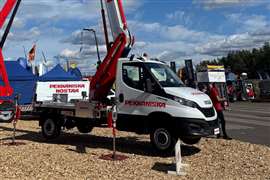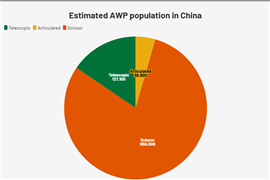Auction action
17 March 2008

Sales of construction equipment are at record-high levels, and you might think that used equipment is moving at the same pace. However, that doesn't seem to be the case, at least in Europe for world-leading equipment auction house, Ritchie Bros.
“If the new equipment market is booming, we should see the same in used equipment. That hasn't happened yet,” Cedric Jandet, marketing manager for Ritchie's European operations, tells IRN. “If you have the right equipment, the [construction equipment] market is very, very good. But the numbers for construction equipment have been more-or-less stable over the past year.”
Mr Jandet says, “Most sellers are rental companies, and they release their equipment when they receive the new. If new equipment is delayed coming to them, they rent out the old.” Regardless, in any type of market, rising or falling, “the benefit of auction is the same. We try to put the whole, big world in front of the items.”
Ritchie's standard commission rate to do that is 14%, rising to 20% for sales under €2500. Mr Jandet says that “commissions are justified by the sales price we get. Is it better for the seller to sell directly and pay for advertising and other sales costs, or to let Ritchie Bros try to get the best price? Owners selling direct don't get the same exposure we give.”
Equipment age varies greatly. “We sell a lot of old and well-used equipment, but we also see a wide range of ages,” says Mr Jandet. “Rental companies [the source of most construction equipment auctioned by Ritchie] have different policies and strategies.”
You could expect equipment condition to match that variation in age, and it doesn't matter to Ritchie. It sells each consignment “as is, where it is.” Although the company “... can paint, if the seller wants, to make everything look nice,” he says.
However, determining machine condition can be important to buyers. Mr Jandet says that many travel to the site to look at the equipment and then return home to bid at the auction. “We don't have many bidding without looking. Most come and look.”
Mr Jandet's observations on bidders' travel underscores Ritchie Bros' view that geography need not be a limiting factor. “People travel great distances to purchase specific equipment to meet their needs,” it says. “This means ... auctions can transcend local conditions and deliver world market prices.”
Ritchie Bros is clearly using the Internet to reduce the effects of distance. Mr Jandet says about 10% of bids in European auctions come over the Internet, while in the US it is 15 to 20%. “The US market is more used to the auction technique,” he says. “Another factor is that the web site is in English.”
There is other geographic market variation, too. “The attitude about auctions in a lot of countries is negative. They are associated with bankruptcy,” he says. Ritchie makes sure of ownership by checking with registration authorities. Doing that is easy in the UK and most western European countries, the source of most equipment it auctions in Europe.
So, geographic factors are important in auctions. The point Mr Jandet makes about getting to auction sites, “It depends on the mentality of people, depends on how people like to travel,” applies more generally. An auction isn't just about equipment, it's also about people.
STAY CONNECTED



Receive the information you need when you need it through our world-leading magazines, newsletters and daily briefings.
CONNECT WITH THE TEAM











